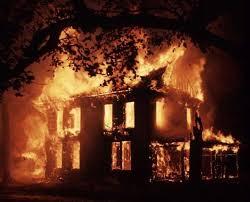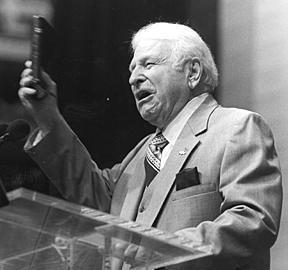
Thornfield Hall burns to the ground
By Alan Bean
Fred Phelps is dead and there is no one to mourn his passing. In the end, poor Fred was abandoned even by the cult built on his own hatred.
One is tempted to see Fred Phelps as an extreme expression of the evangelical impulse. Don’t most prominent evangelicals hate homosexuals just as much as Fred? Doesn’t the evangelical tribe condemn America for its tolerance of the sin of Sodom?
Perhaps, but there is a difference. Pastor Fred learned in the early 1990s that condemning America for being soft on sin was getting him nowhere. By spelling out things out in the most graphic and objectionable fashion Fred and family gained the attention of the world. Westboro Baptist was the Church the world loved to hate, and that was fine with Fred so long as he got his headlines. For the next quarter century, Fred and company made hate their private cottage industry by transforming gross, pornographic insensitivity into an art form.

But Edwards worshiped a God of wrath and beauty. The New England divine could wax rhapsodic about a final consummation in which the glory of God would flood the universe. The God of Fred Phelps was all wrath, all the time; he worshiped a raging fire of hatred that consumed his own soul decades before his heart stopped beating.
When I reflect on the sad Westboro saga, Charlotte Bronte’s novel, Jane Eyre springs to mind. Bookish, practical, kind, dependable, and devoutly Christian in the Victorian sense of the term, Jane falls in love with Mr. Rochester, the only decent person she has encountered in this veil of tears.
But there is something disturbing about Mr. Rochester. A generally decent man with high principles, he can also be morose, moody, brusque, unpredictable and downright unkind.
And then there are those muffled shrieks and groans emanating from the attic of Thornfield Hall, the Gothic mansion Rochester calls home. Gradually, poor Jane unravels the mystery. As a young man in search of adventure and fortune, Rochester married an extravagantly beautify Jamaican Creole temptress names Bertha Antoinetta Mason. He hardly knew the woman when they were married, but she was beautiful, exotic, fabulously wealthy and everyone insisted it was the perfect match. When Bertha quickly descended into madness, Rochester carried her home to Thornfield Hall, locked her in the attic under the supervision of a tipsy spinster named Grace Poole, and tried to reassemble the shattered shards of his.
He was holding it together until Jane Eyre entered his life. As a budding romance unfolded within the cold walls of Thornfield, Rochester pretended to ignore the strange wailing sounds that often pierced the night. Jane followed suit. But one night, the crazy woman in the attic slipped past an inebriated Grace Poole and wrought havoc in Thornfield Hall. Rochester dragged his insane bride back to the attic and bound her to a chair with rope until the madness passed.
Undeterred, Bertha broke free once again, and this time she burned Thornfield Hall to the ground and, to heighten the Gothic effect, leaped to her death as the flames surrounded her.
Which bring us back to Fred Phelps and the sad rabble at Westboro Baptist Church. Fred Phelps didn’t just let the crazy lady in the attic slip past him in an unguarded moment; he unlocked the door, invited her downstairs and handed her a torch. The result was the same; the house burned to the ground and Fred, and everyone he loved, became brands in the burning.
In the right hands, the biblical concept of hell can pay wonderful dividends, but the downside is as horrendous as it is inevitable. Hell fire must be handled with infinite care. Even when it doesn’t burn the house down, it raises questions about the character of God.
Jane Eyre might have asked herself why Mr. Rochester had his poor wife locked in the attic when he could have placed her in an asylum? And why leave her to languish in a dark and cramped space with an inebriated and depressed woman as her only companion? What kind of a man are we dealing with here?
Spend too much time dwelling on the fires of hell and similar questions crop up around the character of God. Why, exactly, does a infinitely merciful God have a torture chamber in the attic? What sort of deity are we dealing with here?

A map of Puritania and its surroundings
In his first book of Christian apologetics, A Pilgrim’s Regress, a youthful C.S. Lewis conjures Puritania, an odd land created and owned by a shadowy figure they call the Landlord. It seems the Landlord checked out many years ago, leaving Puritania in the hands of an avuncular gentleman everyone calls the Steward. At a certain age, every child must visit the Steward to learn about the Landlord and his ways.
When a young boy named John meets the Steward he learns that “the Landlord was quite extraordinarily kind and good to his tenants, and would certainly torture most of them to death the moment he had the slightest pretext.”
When John asks for clarification, he is assured that if he breaks even one of the Landlord’s rules “He’ll take you and shut you up for ever in a black hole full of snakes and scorpions as large as lobsters–for ever and ever. And besides that, he is such a kind, good man, so very, very kind, that I am sure you would never want to displease him.”
The slightest mention of hell creates this kind of cognitive dissonance. Still, if we want our children to cleave to the straight and narrow, a few shrieks and moans from the attic can come in handy. Southern evangelicals, with Baptists leading the way, perfected the hell-raising arts. A delicate balance had to be maintained. You wanted to give the young ones a strong motivation for accepting Jesus as Savior without raising too many questions about the character of God. If impressionable children are told that the eternal conscious torment can be avoided at the low, low price of professing their faith in Jesus, they will make that profession, almost without fail.
But you couldn’t overdo it. At all costs the crazy lady must be safely confined in her cramped dark world. Let her out and she’ll burn the house down.
Fred Phelps wasn’t the only man to hand the tormented to use Bertha Antoinetta Mason for lowdown purposes. In the late 1970s, Southern Baptist conservatives grew weary of being locked out of the power structure of their own denomination by smiling Baptist “moderates” who had evolved beyond traditional Baptist orthodoxy.
Ask the average Southern Baptist layperson how a person gets saved and you will get a ready answer: if you accept Jesus Christ as your Savior, you go to heaven; if you don’t, you go to hell.
Ask your average seminary professor the same question and you are met with awkward silence.
The controversy that engulfed Southern Baptists from, roughly, 1979 to 1992 is often called the “Battle for the Bible,” but it was really a fight about soteriology–the nature of salvation. The professors and administrators on the losing end of this fight had no trouble affirming that heaven awaits the faithful; they just weren’t comfortable with the bit that followed the semi-colon. The fate of non-Christians, they said, should be left in the hands of a merciful God.
These “moderates” were the sons and daughters of the Baptist South. They had been to summer camps where the prospect of an eternity of torment was used to spark “first-time professions of faith.” They had been to countless revivals where the preacher touched on uncomfortable eschatological subjects, especially on youth night. It was all handled as discretely as possible, but evangelists who were graded on their conversion-to-camper ratio couldn’t be too subtle.
The moderates who were driven outside the walls of the Southern Zion were evolving beyond the heaven-hell Christianity they had grown up with. They didn’t want to make a fuss and they weren’t in a hurry; they were just quietly hoping that the eternal conscious torment thing would gradually fade away over the next several generations. They never said so in public, but their silence on the afterlife gave them away.
The insurgents countered silence with noise. The orthodox understanding was at stake. If there is no hell, there is no salvation. Christ died for nothing. Evangelism is pointless. The missionary enterprise becomes an expensive charade. These themes made for marvelous rhetoric.
But to really make their point, conservatives let the crazy lady out of the attic, handed her a wad of gasoline-soaked rags and a box of matches, and stepped aside.
As Fred Phelps discovered to his sorrow, once old Bertha is out of the attic, no amount of water can stop the burning. In popular imagination, the Southern Baptist denomination is now associated with culture war hostility, carte blanche condemnation of everyone outside the orthodox camp, internecine squabbling and the careful maintenance of tribal boundaries.
We suffer from a different set of issue in the moderate, ex-SBC world. As David Gushee argues persuasively, Baptist moderates in the South “lack theological clarity and identity.” Ask us what we mean by “salvation” or “the gospel” and we have a hard time crafting a simple declarative sentence.
Baptist moderates in the ex-SBC world divide roughly along generational lines. Those over 65 remember the pre-controversy SBC with fondness and believe the world would be a better place if folks had just left well enough alone. This older generation of moderates can’t imagine a church with no crazy lady in the attic. They don’t insist on bringing back the old-school revival or the scary campfire talks at summer camp, but they still believe those who reject Jesus are in danger of eternal punishment and secretly wish the preacher would occasionally hint in this direction.

W.A. Criswell
Most middle-aged moderates came of age in the midst of the controversy and have no living memory of the good old days. Hence, they associate words like “salvation” and “gospel” with the fighting fundamentalists who ruined their religion. They cringe inwardly at the very mention of theological terms. Even the word “theology” conjures visions of aging Baptist evangelists inveighing against unbelief in high places. Asked to spell out their beliefs, middle-generation moderates define themselves in antithesis to the conservative faction: “we are the people who don’t believe what they believe.”
Those who grew up outside the old SBC occupy a very different world. Most have never been to a genuine old-time revival and grew up with guilt-free summer camps where never was heard a discouraging word. Since they rarely hear anybody using words like “salvation” or “gospel” they are prime candidates for what sociologist Christian Smith calls moralistic therapeutic deism. If they behave decently they believe they will go to heaven. Since they typically get their religious instruction from the middle-generation Baptists discussed above, hard theological questions are rarely broached in their presence. You can’t really call this generation of Baptists “moderates” since, blessedly, they have never been forced to take sides in a theological food fight.
Realizing that their people have no appetite for heavy theological reflection, moderate Baptist pastors preach innocuous sermons about listening to God, dealing with grief, the joys of Christian community, and the grace of God. The crazy lady in the attic has been silenced for good. A beneficent God smiles sweetly from heaven. It is well with our souls.
Or is it?
Open the Bible and you will find a great gulf is fixed between the pleasant thoughts we encounter in church and the life and death quest for spiritual survival we find in our scriptures. In an effort to keep the crazy lady locked in the closet, have we domesticated the Christian faith? And, more to the point, if the crazy lady is just waiting for a chance to burn the house down, why are most biblical references to hell fire found on the lips of Jesus?
I will address these questions in a subsequent post.
